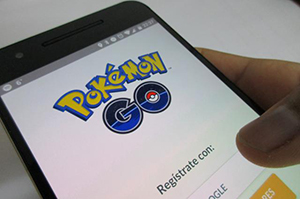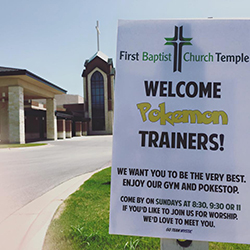Visitors cruise the church parking lot at all hours or walk around the sanctuary exterior—not to worship, but to collect digitized items or to battle electronically.
And some ministers welcome the unexpected Pokemon Go traffic, viewing it as an opportunity to reach young electronic gamers with smartphones who otherwise might not frequent churches.
In the last couple of weeks, a growing number of congregations discovered their facilities are designated as Poke stops or gyms—sites sought out by Pokemon Go players. Some churches—like First Baptist in Temple and Valley Ranch Baptist in Coppell—want to make the most of the global craze.
‘Give a positive impression’
“The game encourages getting out into the community and meeting people, so we are all about it,” said Evan Duncan, college and media pastor at First Baptist in Temple. “Some of these players likely have negative opinions of church or Christianity, and if we can help give a positive impression, that is a win.”
As most Millennials—or many parents of Millennials—know, Pokemon began in 1995 as a Japanese video game. But within a few years, it spawned an animated television series, movies and a seemingly unlimited number of trading cards, building an enthusiastic international fan base.
 Within 10 days of its July 6 launch in the United States, Pokemon Go was downloaded to more than 15 million remote devices. The media franchise focuses on fictional creatures—Pokemon or “pocket monsters”—that humans seek to catch and then train to battle each other. Pokemon Go is an “augmented reality” game played on a smartphone, which means when a player is near a Pokemon, the cell phone camera makes it appear as if the player is catching the Pokemon in the real world. Within 10 days of its launch, the game was downloaded more than 15 million times.
Within 10 days of its July 6 launch in the United States, Pokemon Go was downloaded to more than 15 million remote devices. The media franchise focuses on fictional creatures—Pokemon or “pocket monsters”—that humans seek to catch and then train to battle each other. Pokemon Go is an “augmented reality” game played on a smartphone, which means when a player is near a Pokemon, the cell phone camera makes it appear as if the player is catching the Pokemon in the real world. Within 10 days of its launch, the game was downloaded more than 15 million times.
Generating significant traffic
Real-world sites—such as churches—selected for the game are designated as Poke stops or gyms. At the Poke stops, trainers can collect items that increase their chances of catching a Pokemon or prevailing in battle. At a gym, players train and battle any Pokemon they catch.
Sign up for our weekly edition and get all our headlines in your inbox on Thursdays
 Evan Duncan, college and media pastor at First Baptist Church in Temple, posted signs to let Pokemon Go trainers know they are welcome at church.“Our church is a stop and a gym, and that means we have about one car every five minutes driving up to our church building,” Duncan said. “In the evenings, there will be as many as eight cars full of players at any given time.”
Evan Duncan, college and media pastor at First Baptist Church in Temple, posted signs to let Pokemon Go trainers know they are welcome at church.“Our church is a stop and a gym, and that means we have about one car every five minutes driving up to our church building,” Duncan said. “In the evenings, there will be as many as eight cars full of players at any given time.”
So, Duncan posted signs welcoming players, encouraging them to enjoy themselves and letting them know when worship services are scheduled.
Rich Roush, minister to students at Valley Ranch Baptist Church in Coppell, likewise has seen a steady stream of traffic entering the church’s parking lot, and he expects it to increase in upcoming weeks.
‘Happy hunting’
He and another staff member soon began to brainstorm ways to seize the opportunity for ministry and outreach—posting “happy hunting” signs and setting out coolers with bottles of free water for Pokemon trainers.
Both Roush and Duncan also bought electronic “lures” that can be turned on to attract Pokemon—and the trainers who seek them—at times when volunteers are available to engage players in conversation.
“We’ll try it throughout the summer and see how it works,” Roush said.
Not universally welcomed
Not all Poke stops and gyms welcome the traffic. Officials at the U.S. Holocaust Museum and Arlington National Cemetery considered the play inappropriate at their locations and asked players to stop catching Pokemon at their sites.
Likewise, some churches have voiced concerns about safety issues the unexpected traffic can present.
Duncan, 26, understands the game’s appeal, having grown up at the height of the initial Pokemon phenomenon.
“So, I’m their prime demographic,” he acknowledged.
At 32, Roush saw himself as “too old” to play Pokemon when he was a teenager. But he has learned the intricacies of Pokemon Go quickly, earning enough experience points to become—in his words—“a proud Level 8 Trainer” in one week. He sees it as a way to build rapport with gamers.
“A lot of adults struggle to talk to middle schoolers,” he said. “This gives them something in common to talk about.”
More than just the ‘Pokemon church’
Players eager to move from one site to another may not spend a lot of time in extended conversation at a Poke stop or gym, but even brief interaction gives churches the opportunity to make a good impression, Duncan emphasized.
“It sends a positive message (to gamers) that we are a church where they might want to go—where they would fit in and feel welcome,” he said.
Some social observers saw the July 6 launch date for Pokemon Go’s release in the United States as timely—one day after the shooting of Alton Sterling in Baton Rouge, La., the same day Philando Castile was shot to death in suburban St. Paul, Minn., and one day before Dallas police officers were ambushed in downtown Dallas. The game offered a welcome diversion from tragic events, they noted.
“There are a lot of things going on in the world right now,” Duncan acknowledged. “I know this is a pretty silly thing, but it’s just one of several things we are doing to impact the community.
“We are not just the Pokemon church. We are also the church that feeds the poor and hungry. And we’re the church that leads people to Christ.”
















We seek to connect God’s story and God’s people around the world. To learn more about God’s story, click here.
Send comments and feedback to Eric Black, our editor. For comments to be published, please specify “letter to the editor.” Maximum length for publication is 300 words.